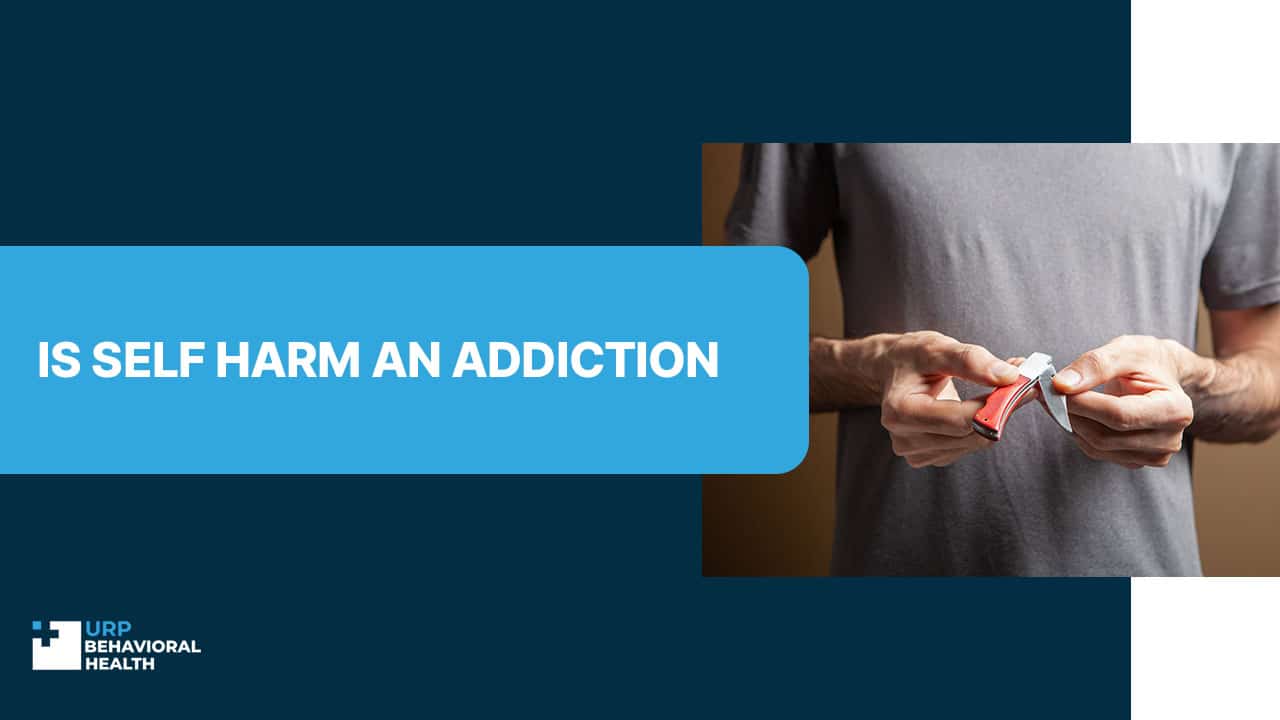
Is Self Harm an Addiction?
The term self-harm refers to physical abuse a person causes to themselves. Typically, self-harm is not related to suicidal intentions and the background of this behavioral pattern is quite another than in suicidal cases. The most prominent features of self-harm are direct injuries made to the skin, tissues, or parts of the body. At once, self-mutilation is diverse in its essence.
Some prefer to cut themselves with knives or sharp items, others can make bruises on their body or set themselves on fire. There are issues of self-harm expressed in scratching the skin with fingernails or pulling out hair. In any case, self-harm is destructive and brings a person a lot of pain.
Yet, do you know that scientists and medical researchers still argue about whether self harm addiction in its essence or not? Let’s learn more about the matter of self harm addiction in the URP Behavioral Health blog.
Can Self-Harm Be an Addiction?
First, let’s decide on the terms. Self-harm is not an official term although it is widely used by scientists and psychologists in popular science. In official sources, the term non-suicidal self-injury (NSSI) is used. Although the phenomenon of self-harm is non-suicidal by default, studies prove that up to 60% of suicides are accompanied by self-harm issues [1].
Contact our admissions team now to begin your path toward a brighter future.
At once, the process of self-mutilation is often repeated and this leads to the hypothesis that self harm is an addiction like substance abuse, shopping, Internet surfing, or gambling. Yet, DSM-5-TR, as the leading document regulating mental disorders classification doesn’t recognize NSSI as an addiction officially bringing the official status of addiction only to substance abuse and gambling. At once, it mentions that other types of addictions probably may exist but they lack scientific investigations.
So, the addictive essence of self-harm is still questionable, but it seems to be true due to the following reasons:
- Often self-harm episodes are repeating;
- They typically increase in their intensity and the severity of injuries.
As for the demographic metrics of self-harm, they are as follows:
- More females tend to self-harm.
- An average age for self-harm is teenage and young adolescence.
- In the study provided by Sarah Elizabeth Victor, Catherine Rose Glenn, and Elisha David Klonsky [2], the relationship between NSSI and substance abuse was proved.
Why Is Self Harm So Addictive?
People who mutilate themselves feel better after the issue of self-harm because of the stimulation of the endogenous opioid system by the pain caused by self-harm. As a result, the body produces special chemicals which work like alcohol or drug chemicals bringing relief. This physiological background of self-harm proves its addictive nature.
Don’t wait - confidential help is available right now for you or your loved one.
The Psychology Behind Self-Harm
As for the psychological background, it was proved that self harm as an addiction is strongly related to coping with severe emotional distress which a person is trying to overcome now or has experienced in the past [3]. The main causes of self-injury are as follows according to this study:
- Bullying or pressure at school, college or at work;
- Relationship problems;
- Issues of deep grief or losses.
At once, there are studies which relate self-harming addictive behavioral patterns with mental disorders.
Self Harm Addiction Study – What Do Scientists Investigate About It
According to the study [4], there are high risks of self-harm and addiction related to it in people with the following mental health diagnoses:
- Depression;
- Bipolar disorder;
- Schizophrenia;
- Eating disorders;
- Anxiety and neurotic disorders;
- Alcohol and substance abuse.
How Addictive Is Self Harm?
Due to the fact that self-harm is often a kind of coping mechanism to relieve intense emotional pain or distress, it is highly addictive. Once a person feels relief after harming oneself, the mechanism of addiction typically starts.
At once, you shouldn’t give up if you or your loved ones experience NSSI episodes. The fact is that you won’t feel the same all your lifetime, and with professional help, you can get a remedy for your distress without harming yourself. The best idea is to apply for the help of behavioral health specialists and undergo rehab treatment. In the URP Behavioral Health center, you can get help to reduce your self-harm behavior and mitigates its causes.
Our team will verify your insurance and design a plan tailored to your needs.
Resources:
- https://www.cambridge.org/core/journals/the-british-journal-of-psychiatry/article/suicide-following-deliberate-selfharm-longterm-followup-of-patients-who-presented-to-a-general-hospital/2A40FE4860E86668306A98F07F21D6FC
- https://pmc.ncbi.nlm.nih.gov/articles/PMC3625678/#abstract1
- https://www.nhs.uk/mental-health/feelings-symptoms-behaviours/behaviours/self-harm/why-people-self-harm/
- https://pmc.ncbi.nlm.nih.gov/articles/PMC4023515/#sec7-0141076814522033
















